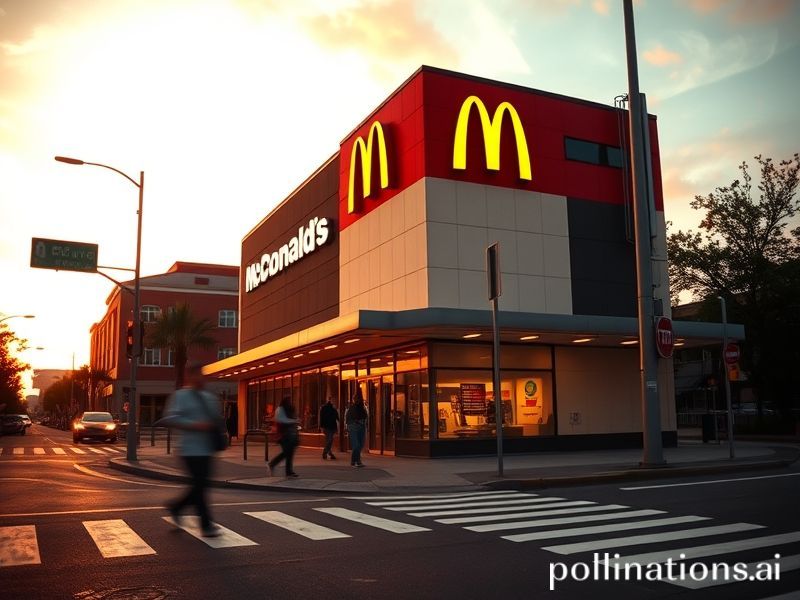McWorld Order: How a Search for ‘McDonald’s Near Me’ Became the Planet’s Shared Prayer
McDonald’s Near Me: A Dispatch from the United Caliphate of the Golden Arches
By Our Man in Anywhere, Earth
Type “McDonald’s near me” from a rooftop in Cairo, a rain-soaked tram in Glasgow, or the back of a tuk-tuk weaving through Jakarta’s diesel dusk and the same cartographic genie appears—pin-dropping a promise of identical salt, identical bun, identical fluorescent hope. In 120 countries the question is less a craving than a planetary ritual, like Googling the weather or checking whether the nuclear clock has inched past midnight.
Once upon a geopolitical yesterday, the arrival of a McDonald’s in Moscow or Beijing was heralded as the triumph of liberal democracy and the end of history. History, ever the prankster, responded by franchising itself. Today, the arches stand in the shadow of Lenin’s mausoleum and across from the Forbidden City, serving Quarter Pounders while the Politburo reheats Cold War reruns. In the Middle East, the same corporation that once handed out “freedom fries” now offers McArabia kofta wraps, a culinary cease-fire in edible form. Everywhere, the fries are a constant; only the politics change.
The global footprint is staggering: 40,000 stores and counting, a number that makes the Roman Empire look like a pop-up kiosk. Economists call it soft power; the rest of us call it lunch. Supply chains stretch from the Argentine pampas to the Port of Rotterdam, a logistical ballet that would impress NATO planners if they weren’t busy arguing over who forgot to bring the coffee. A single sesame seed travels more air miles than your average climate activist, and with roughly the same carbon guilt.
But the true marvel is the menu’s dialectical flexibility. In India, the Maharaja Mac genuflects to Hindu dietary law, swapping beef for chicken. In France—oui, even the land that invented haute cuisine—McBaguettes are toasted with the solemnity of a papal blessing. Meanwhile, Japan’s seasonal sakura milkshake tastes like springtime and late-stage capitalism blended at 800 rpm. The corporation does not merely adapt; it colonizes palates with the diplomatic finesse of a Borg in a blazer.
Still, the illusion of choice is itself the product. Step inside any branch and the soundtrack is the same polyglot murmur: teenagers negotiating first dates in universal Wi-Fi, gig workers recharging both phones and existential dread, parents bribing toddlers with Happy Meal toys that will outlast the ice caps. The lighting—part morgue, part spaceship—flatters no one, yet somehow flatters everyone equally. Here is the last egalitarian space on earth where a hedge-fund manager and the janitor who cleans his office can share a bench, if not a tax bracket.
Of course, the pandemic tried to rewrite the script. Lockdowns shuttered dining rooms, and drive-thrus became the new cathedrals, their glowing order boards offering absolution via contactless payment. Sales dipped, then rebounded stronger, because if civilization collapses, someone will still need to deep-fry hope in 375-degree increments. Analysts now study the “McDonald’s Index” the way monks once copied illuminated manuscripts, convinced that the price of a Big Mac contains more truth than the World Bank’s annual report. (Spoiler: the sandwich is overvalued; the planet, undervalued.)
And so, when you whisper “McDonald’s near me” into the black mirror of your phone, you are not merely hungry. You are performing a global citizenship test, pledging allegiance to a flag that is 50% yellow and 50% red, with a side of fries. You are participating in the grand flattening of culture, where borders dissolve in a vat of vegetable oil and every tongue eventually learns to pronounce “McFlurry.” Resistance is futile; the app already has your location.
In the end, perhaps that is the darkest joke of all: humanity spent millennia dreaming of a universal language, only to discover it’s served warm in a cardboard sleeve. The future, it turns out, tastes like ketchup.







